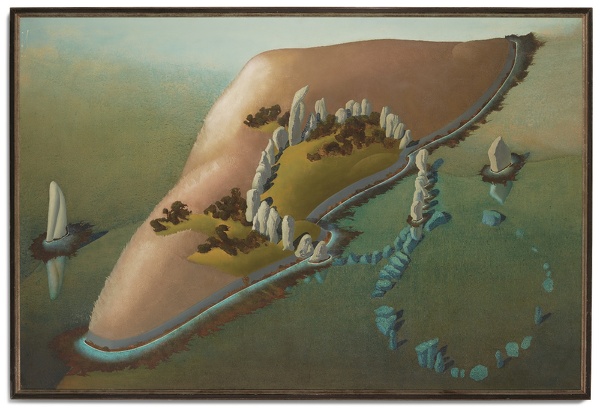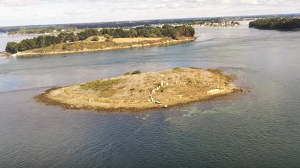

 Hover over the painting to magnify (there may be an initial delay while the magnified image is loaded)
Hover over the painting to magnify (there may be an initial delay while the magnified image is loaded)Ithell Colquhoun (1906-1988):
La Cathédrale Engloutie, circa 1950
Framed (ref: 9926)
Oil on canvas
See all works by Ithell Colquhoun oil landscape religion 49 pictures Rediscovering Women Artist RELIGION
Provenance: Atelier de l'artiste; vente, Sotheby's, Londres, 24 avril 1985, lot 535 Collection privée, Royaume-Uni; vente anonyme, Christie's, Londres, 9 novembre 1990, lot 231 The Mayor Gallery, Londres (acquis au cours de cette vente) Collection Vera et Arturo Sch
ProvenanceSotheby’s, studio sale, 24 April 1985, lot 535. Christie's, 9 Nov. 1990, lot 231, ill. col.The Israel Museum, Jerusalem, Arturo Schwartz collection.
Exhibited: London, Royal Academy, 1952, no. 755. London, WIAC, 1953, no. 97. Bradford, Cartwright Hall, 1954, no. 41.Penzance, Newlyn Gallery, 1961, no. 2. Exeter, City Art Gallery, 1972, no. 14. Penzance, Newlyn Gallery, 1976, no. 21.Jerusalem, Israel Museum, 2000-2001, no. 133, as 1948, ill. col. (in reverse). Dulwich Picture Gallery, British Surrealism, February-May 2020
An aerial view of two adjoining stone circles with out-lying monoliths, standing on a small island. One stone circle lies half in and half out of the water, whilst the other stands fully in the water. The painting was inspired by the stone circles on the islet of Er-Lannic. When built, the monuments stood on a little hillside, but are now half-hidden by the waters of the Gulf of Morbihan, Brittany. Archaeologists agree that this is due to a rise in sea level that has occurred since prehistoric times. Colquhoun offers an alternative suggestion: ‘perhaps the daily immersion of this temple, dedicated to the powers of both sea and earth was intended by its builders.’ (Cornish Banner, June 1978).The title is a reference to the Prelude for piano by Claude Debussy. The piece is a musical depiction of a legendary cathedral, submerged and in ruins beneath the water, which mysteriously rises from the waves and into the sparkling light of day, then sinks again into the depths.Rocky Island (1969) is the reworked counterpart to part of this painting.

 British Neo-Romanticism
British Neo-Romanticism Privately held
Privately held




